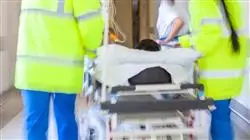University certificate
The world's largest faculty of medicine”
Introduction to the Program
This course deals with clinical procedures in the face of life-threatening emergencies, so that you will be able to deal with situations that may compromise the patient's life. Learn how to identify, initially treat and transfer a patient in a life-threatening emergency situation"

Medical emergencies require specialized care to ensure that the person's life support is maintained while acting on potential problems in the body's vital systems to prevent future complications to the person's health.
The Postgraduate certificate in Vital Emergencies is designed to update the physician's knowledge in cardiac, respiratory, neurological, digestive, endocrinometabolic and hydroelectrolytic emergency care, in order to provide quality medical care to patients with pathologies and health problems affecting the organs and vital systems.
After completing the course, the professional will be able to prioritize situations, solve problems and make decisions in the care of patients in emergency medical situations, both in adult and pediatric patients.
Expand your knowledge through the Postgraduate certificate in Vital Emergencies in a practical way and adapted to your needs”
This Postgraduate certificate in Vital Emergencies contains the most complete and up-to-date scientific program on the market. The most important features include:
- Clinical cases presented by experts in emergencies.
- The graphic, schematic, and practical contents with which they are created, provide scientific and practical information on the disciplines that are essential for professional practice
- Diagnostic and therapeutic innovations on how to deal with situations of cardiovascular and respiratory emergencies
- An algorithm-based interactive learning system for decision-making in the different clinical situations presented throughout the course
- All of this will be complemented by theoretical lessons, questions to the expert, debate forums on controversial topics, and individual reflection assignments.
- Content that is accessible from any fixed or portable device with an Internet connection
This Postgraduate certificate is the best investment you can make when selecting a refresher program, for two reasons: in addition to updating your knowledge in Vital Emergencies, you will obtain a qualification from TECH Global University"
Forming part of the teaching staff is a group of professionals from the field of emergencies, who bring to this training their work experience, as well as a group of renowned specialists, recognized by esteemed scientific communities.
The multimedia content developed with the latest educational technology will provide the professional with situated and contextual learning, i.e., a simulated environment that will provide an immersive training program to train in real situations.
This program is designed around Problem-Based Learning, whereby the physician must try to solve the different professional practice situations that arise throughout the Postgraduate Certificate. For this reason, you will be assisted by an innovative, interactive video system created by renowned and experienced experts in the field of emergencies with extensive teaching experience.
This online methodology allows you to practice in a simulated environment through clinical cases"

Make the most of the opportunity to update your knowlegde in how to act in Vital Emergencies"
Why study at TECH?
TECH is the world’s largest online university. With an impressive catalog of more than 14,000 university programs available in 11 languages, it is positioned as a leader in employability, with a 99% job placement rate. In addition, it relies on an enormous faculty of more than 6,000 professors of the highest international renown.

Study at the world's largest online university and guarantee your professional success. The future starts at TECH”
The world’s best online university according to FORBES
The prestigious Forbes magazine, specialized in business and finance, has highlighted TECH as “the world's best online university” This is what they have recently stated in an article in their digital edition in which they echo the success story of this institution, “thanks to the academic offer it provides, the selection of its teaching staff, and an innovative learning method aimed at educating the professionals of the future”
A revolutionary study method, a cutting-edge faculty and a practical focus: the key to TECH's success.
The most complete study plans on the university scene
TECH offers the most complete study plans on the university scene, with syllabuses that cover fundamental concepts and, at the same time, the main scientific advances in their specific scientific areas. In addition, these programs are continuously being updated to guarantee students the academic vanguard and the most in-demand professional skills. In this way, the university's qualifications provide its graduates with a significant advantage to propel their careers to success.
TECH offers the most comprehensive and intensive study plans on the current university scene.
A world-class teaching staff
TECH's teaching staff is made up of more than 6,000 professors with the highest international recognition. Professors, researchers and top executives of multinational companies, including Isaiah Covington, performance coach of the Boston Celtics; Magda Romanska, principal investigator at Harvard MetaLAB; Ignacio Wistumba, chairman of the department of translational molecular pathology at MD Anderson Cancer Center; and D.W. Pine, creative director of TIME magazine, among others.
Internationally renowned experts, specialized in different branches of Health, Technology, Communication and Business, form part of the TECH faculty.
A unique learning method
TECH is the first university to use Relearning in all its programs. It is the best online learning methodology, accredited with international teaching quality certifications, provided by prestigious educational agencies. In addition, this disruptive educational model is complemented with the “Case Method”, thereby setting up a unique online teaching strategy. Innovative teaching resources are also implemented, including detailed videos, infographics and interactive summaries.
TECH combines Relearning and the Case Method in all its university programs to guarantee excellent theoretical and practical learning, studying whenever and wherever you want.
The world's largest online university
TECH is the world’s largest online university. We are the largest educational institution, with the best and widest online educational catalog, one hundred percent online and covering the vast majority of areas of knowledge. We offer a large selection of our own degrees and accredited online undergraduate and postgraduate degrees. In total, more than 14,000 university degrees, in eleven different languages, make us the largest educational largest in the world.
TECH has the world's most extensive catalog of academic and official programs, available in more than 11 languages.
Google Premier Partner
The American technology giant has awarded TECH the Google Google Premier Partner badge. This award, which is only available to 3% of the world's companies, highlights the efficient, flexible and tailored experience that this university provides to students. The recognition as a Google Premier Partner not only accredits the maximum rigor, performance and investment in TECH's digital infrastructures, but also places this university as one of the world's leading technology companies.
Google has positioned TECH in the top 3% of the world's most important technology companies by awarding it its Google Premier Partner badge.
The official online university of the NBA
TECH is the official online university of the NBA. Thanks to our agreement with the biggest league in basketball, we offer our students exclusive university programs, as well as a wide variety of educational resources focused on the business of the league and other areas of the sports industry. Each program is made up of a uniquely designed syllabus and features exceptional guest hosts: professionals with a distinguished sports background who will offer their expertise on the most relevant topics.
TECH has been selected by the NBA, the world's top basketball league, as its official online university.
The top-rated university by its students
Students have positioned TECH as the world's top-rated university on the main review websites, with a highest rating of 4.9 out of 5, obtained from more than 1,000 reviews. These results consolidate TECH as the benchmark university institution at an international level, reflecting the excellence and positive impact of its educational model.” reflecting the excellence and positive impact of its educational model.”
TECH is the world’s top-rated university by its students.
Leaders in employability
TECH has managed to become the leading university in employability. 99% of its students obtain jobs in the academic field they have studied, within one year of completing any of the university's programs. A similar number achieve immediate career enhancement. All this thanks to a study methodology that bases its effectiveness on the acquisition of practical skills, which are absolutely necessary for professional development.
99% of TECH graduates find a job within a year of completing their studies.
Postgraduate Certificate in Vital Emergencies
Syncope, cardiac arrhythmia, acute dyspnea, stroke. All these are terms that trigger the hospital and clinical red alert leading medical personnel, from their various areas, to test their most rigorous competencies for patient intervention. Understanding how essential it is for the health sector to be continuously updated in such an essential field as intensive care, TECH Global University has devised the Postgraduate Certificate in Vital Emergencies, an online course where the most experienced teaching staff makes use of innovative academic methodologies and state-of-the-art multimedia material to provide an incredible training experience, free of fixed schedules. Regarding the content you will be able to explore, it includes the integral attention to emergencies and health emergencies, biosafety, as well as the different types of emergencies: cardiovascular, hypertensive, respiratory, neurological, digestive and endocrinometabolic. Each one dissected into several subtopics among which you will see some of the conditions listed at the beginning of the text. Looking for high-level medical professionalism? TECH is the answer.>/p>
Vital emergencies in a single online course
Immediacy and diligence, these are two words that cannot be missing in the care of a patient who enters a medical unit for a vital emergency, this being understood as a clinical condition where there is evidence of imminent danger of death or serious functional sequelae. In order to act with all the suitability required by the circumstance, it is necessary to possess specialized skills previously developed in a meticulous way. By accessing a Postgraduate Certificate such as the one offered by TECH, you will be able to achieve this last objective with the ease offered by virtual learning, but without leaving aside the medical-scientific rigor. Our model of self-regulated classes combined with a high level of technological and pedagogical interaction, will prepare you to learn from emergency communication skills, through the management of an aortic dissection or a pleural effusion, to the analysis of an acute biliary pathology. Here you'll find everything you need to broaden your career horizons and lead your career to professional success.







